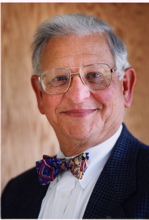Personal medical data goes digital

This story was published on BU Today September 27, 2005.
A wallet bursting with papers containing important medical information is hardly useful for doctors or safe for patients. As a physician, Carl Franzblau knows how important it is to keep his medical records up-to-date and accessible for himself and his doctor, but inaccessible to the general public.
Until nine months ago, there was no way to store personal medical records and share them with doctors, family members, or emergency workers without using paper or the Internet, which could jeopardize the privacy of information. So Franzblau invented the Med-InfoChip — a flash drive with a USB port that needs no special software to run on almost any computer (all the necessary software is in the chip). It can be used on most PCs and Apple computers.
Franzblau is a School of Medicine professor and chairman of the department of biochemistry and associate dean of Graduate Medical Sciences. Working with colleagues in his spare time, he developed the Med-InfoChip, which has so far sold nearly 100 units with no advertising. His company, Med-InfoChip LLC, is prepared to scale up manufacturing as the device becomes more popular. Franzblau and colleague and longtime friend Jay Kaplan founded the company in January 2004. It is based in Boynton Beach, Florida. They sell the chip on their web site for $69.95, or $99.95 for a double-user version.
Hospitals are increasingly using electronic records, but more than 80 percent of doctors’ offices still keep records on paper, rather than electronically, Franzblau says. He believes that storing medical records electronically doesn’t have to be technical, unsafe, or inaccessible. The database in the Med-InfoChip is in a kiosk format (think ATM), so there are no complicated menus in which to get lost, Franzblau says. Users plug the device into a computer and fill in their medical information with as much detail as they would like. “It’s designed to be flexible for the patient,” he says.
The information is permanently stored there and can be changed only by a user with a password. This feature was added so the chip can be plugged into the laptop of an emergency worker, such as an EMT in an ambulance, and specific “emergency” information will pop up in an obvious box, but none of the information can be altered. Because the software on the chip is compatible with almost any computer, a doctor’s office can easily plug in the device to its computers to get information from a patient. “Every doctor we’ve brought it to says they love it,” Franzblau says.
Another feature allows the entire document to be printed to form a booklet. There are spaces to store images, such as scans of an EKG, a birth certificate, X-rays, test results, or other documents. The double-user configuration of the chip allows two sets of records on one chip, so bearers can keep their own records and their spouse’s records. The ability to share and update records is also useful, he says, for caregivers who need to maintain medical records for a loved one.
To date the Med-InfoChip comes in two forms: a chip that looks like a credit card, or a smaller version in its own case that can go on a keychain. Franzblau is in the process of developing the system in Spanish, German, and French and making other updates. The first installment of improvements will probably be offered free to people who already own one, he says.